David Cameron and Barack Obama in anti-terror push
- Published
David Cameron: "Britain and America face threats to national security by people who hate what our countries stand for"
Britain and the US are to share expertise on preventing radicalism and tackling domestic "violent extremism".
Prime Minister David Cameron announced the move following talks with President Barack Obama at the White House, warning that they both faced a "poisonous and fanatical ideology".
The taskforce will report back to the two leaders within six months.
Mr Cameron also said Britain would deploy more unarmed drones to help ground forces tackle Islamic State.
The prime minister is on a two-day visit to Washington for talks with President Obama, likely to be his final Washington visit before the UK general election in May.
Barack Obama on Islamic State: "We are systematically taking out their fighters"
At a press conference in the White House, Mr Obama hailed Mr Cameron as a "great friend" while the British prime minister said the US was a "kindred spirit".
The talks between the two leaders came a week after the deadly terrorist attacks in Paris which killed 17 people.
Concerns over additional attacks by Islamic extremists intensified on Thursday, after an anti-terror raid by police in Belgium, to pre-empt what officials called a major impending attack.
'Fanatical ideology'
UK police have said there is "heightened concern" about the risk to the UK's Jewish communities and are considering stepping up patrols in certain areas.
Mr Cameron said it was a "sensible, precautionary" measure to take to "reassure those communities".
Mr Cameron said: "We face a poisonous and fanatical ideology that wants to pervert one of the world's major religions, Islam, and create conflict, terror and death.
"With our allies we will confront it wherever it appears."
Assistant Commissioner Mark Rowley, the UK's police lead for counter-terrorism, has said police have been reviewing their own security since the Paris attacks.
"We are also considering what further measures we might put in place to enhance the security of police officers, given some of the deliberate targeting of the police we have seen in a number of countries across Europe and the world," he said.
"Chief constables across the country are reviewing how to strengthen the protection of their officers from such attacks."
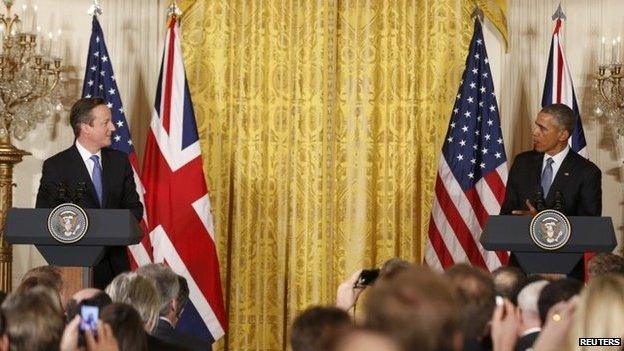
Mr Cameron said the UK and US have been "kindred spirits" for almost two centuries
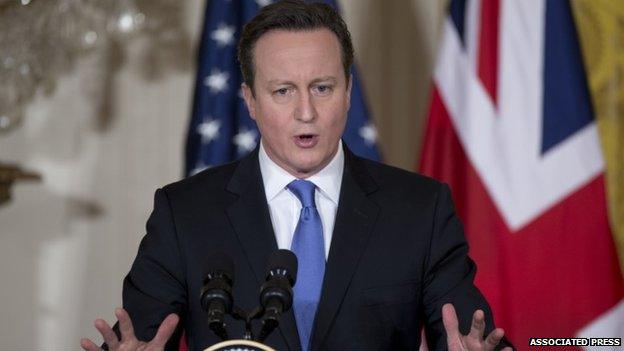
Britain and America's national security was at threat from people "who hate what our countries stand for", Mr Cameron said
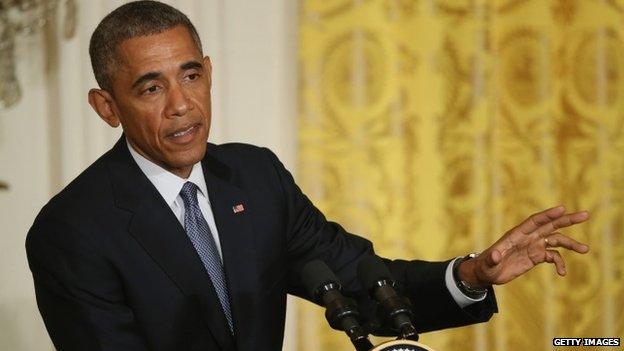
Mr Obama said the Paris attacks underlined the continuing threat from terrorist groups
President Obama said the US, UK and its allies were "working seamlessly to prevent attacks and defeat these terrorist networks".
Asked whether an attack was "imminent" in Britain, Mr Cameron said the terror threat level, set independently by the Joint Terrorism Assessment Centre, was currently at "severe" - meaning an attack is "highly likely".
'Long struggle'
He warned that the fight against terrorism "is going to be a long, patient and hard struggle" but added that he was "quite convinced we will overcome it".
The prime minister also announced that the UK would send an additional 1,000 troops to take part in Nato military exercises in the Baltic states and eastern Europe amid heightened tensions in the region following Russia's conflict with Ukraine.
On Iran, Mr Cameron cautioned against further sanctions on the country over its nuclear programme, warning that it would be "counter-productive" and could undermine efforts for a diplomatic solution.
He said the UK and US remained committed to ensuring Iran cannot develop a nuclear weapon, but added: "The best way to achieve that now is to create the space for negotiations to succeed."
Mr Cameron said he had called "a couple" of US senators earlier in the day to make the case against further economic penalties while talks are ongoing.
Ahead of the talks at the White House, which lasted just over an hour, it was announced that the UK and US are to carry out "war game" cyber attacks on each other as part of a new joint defence against online criminals.
The White House also confirmed that Mr Cameron had pressed Mr Obama to transfer British resident Shaker Aamer from the Guantanamo Bay prison camp to the UK.
The Saudi Arabian citizen, who lives in London with his British wife and children, has not been charged but has reportedly only been cleared for release to his country of birth.
National Security Council spokeswoman Bernadette Meehan said: "The president committed to the prime minister that we will prioritise this case, while making sure any action taken is consistent with our national security."
Meanwhile, following Mr Obama's visit to Stonehenge last September, Mr Cameron presented him with a Henry Moore print of the monument, one of just 40 made. The prime minister was given a first edition of Benjamin P Thomas's 1952 biography of Abraham Lincoln and a pair of brass bookends.
- Published16 January 2015
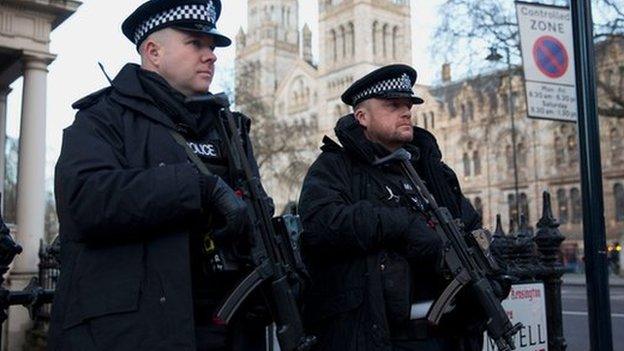
- Published15 January 2015
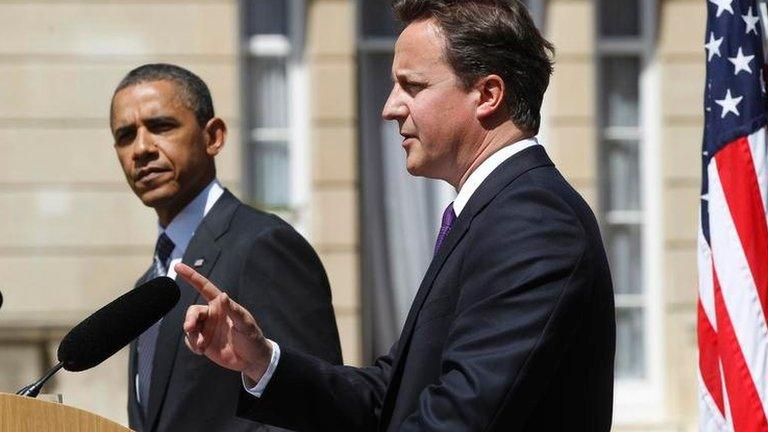
- Published16 January 2015
